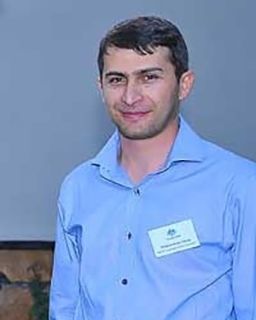"I found ANU a place where everyone’s opinion has a value. ANU provides an opportunity for its students to think critically, challenge an argument, initiate a discussion and generate new ideas.”
An ANU graduate has used a Master of Social Research to land a job with the World Bank in his home country, Afghanistan.
Ateeq Zaki spent two years in the Australian Demographic and Social Research Institute, now called the School of Demography.
“When I joined in April 2011, everything was totally new for me – the country, people, culture, university and environment,” recalled Ateeq, whose background was in medicine and project management.
“The learning experience was also different. I used to study in a teacher-dominant style where students had to obey their teachers, whether they were right or wrong.
“On the other hand, I found ANU a place where everyone’s opinion has a value. ANU provides an opportunity for its students to think critically, challenge an argument, initiate a discussion and generate new ideas.”
He first completed a Graduate Certificate in Social Research and then gained advanced skills in Demography and Research Methods through the Master of Social Research program.
Ateeq particularly liked a course on theory and practice and an independent research component which applied all he learned in the previous three semesters.
“I worked on Ethnic Fertility Differentials in Afghanistan. My paper was selected, among 1,400 papers, for an oral presentation for the 3rd Asian Population Association Conference in Kuala Lumpur in July this year,” he says.
“At ANU I received a letter of commendation from the Chancellor for my outstanding academic achievements during my first semester.”
After graduating he worked at Afghanistan’s Agriculture Ministry for two years, before starting with the World Bank as a social development specialist.
In 2016, Ateeq spent six months as Assistant to Afghan President Mohammad Ashraf Ghani, an experience Ateeq says he will never forget.
His duties included managing the President’s desk, communications and meetings, liaising with ministries and helping with the President’s schedule.
“My six months there was the equivalent to working a full year,” Ateeq says.
“On average, I worked 13 hours per day, although some days I’d work up to 17 hours, and some weekends and holidays, too.
“But despite that, it was exciting working with President Ghani, and I never felt tired. He is a caring and humble person, supervisor and leader, and cares for Afghanistan and its people.”
At ANU, Ateeq studied on an Australian government foreign aid scholarship.
“I thank every single Australian taxpayer for making it possible for me to complete my degree,” Ateeq says.
Among the skills he gained were quantitative and qualitative research, data collection and analysis, and critical thinking.
Ateeq arrived in Canberra when his son was six-months-old, so he made four trips to Kabul in two years.
He also explored beyond Canberra, and recalls a road trip with friends.
“We drove inland all the way to Cairns and Port Douglas and came back along the coastline to Sydney and Canberra – 6,300 km in 14 days,” Ateeq says.
“I will remember the excitement of the trip and beauty of Australia for ever. Our most extraordinary experience was in Queensland, stopping by a self-service banana stall on a highway. This proved the strong culture, great manners and honesty of Australian people.”
Ateeq also recommends living with a host family, and appreciates his final semester with the Coulson family with whom he shared ideas and cultural differences.
Ateeq appreciated the advantages that studying in Canberra can offer.
“Canberra might not be a popular place for its night life for some people but it is the most suitable place for studying.
“ANU in the heart of Canberra, in walking distance to Parliament and public parks with barbecues made Canberra my favourite place to live, study and work.”

